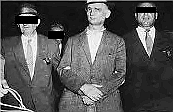Secret police
Secret police are government or state-sponsored agencies that operate in secrecy to maintain national security against internal threats, including espionage, terrorism, and political dissent. They often employ covert operations, surveillance, and interrogation techniques to gather intelligence and suppress opposition. Unlike regular law enforcement agencies, secret police organizations typically operate with little oversight or accountability, leading to potential abuses of power, including violations of human rights.
History[edit | edit source]
The concept of secret police has existed for centuries, evolving alongside the state's need to protect itself from internal threats. One of the earliest examples is the Roman frumentarii, who, among other duties, acted as secret police to maintain the security of the empire. In the modern era, the term "secret police" has been associated with various regimes, both totalitarian and authoritarian, where the suppression of political dissent and the monitoring of citizens' activities are deemed necessary for state security.
Notable Secret Police Organizations[edit | edit source]
Several secret police organizations have become infamous for their operations and the fear they instilled within their respective populations. These include:
- The Cheka, later known as the NKVD and then the KGB, of the Soviet Union, which played a crucial role in the Red Terror and the Great Purge. - The Gestapo of Nazi Germany, which was instrumental in the enforcement of Nazi ideology, including the persecution of Jews and other minorities. - The Stasi of East Germany, known for its extensive surveillance and repression during the Cold War. - The SAVAK of Iran before the 1979 Iranian Revolution, which was notorious for its brutal tactics in suppressing opposition to the Shah's regime.
Functions and Operations[edit | edit source]
Secret police organizations typically engage in a range of activities to fulfill their mandate of protecting state security. These activities can include:
- Surveillance of suspected dissidents and foreign agents - Infiltration and disruption of political opposition groups - Interrogation and torture of detainees - Execution or assassination of perceived threats - Propaganda operations to manipulate public opinion
Criticism and Human Rights Concerns[edit | edit source]
Secret police agencies have been widely criticized for their methods, which often involve the violation of fundamental human rights, such as the right to privacy, freedom of speech, and freedom from arbitrary detention and torture. The lack of transparency and accountability in their operations allows for abuses of power, including political repression, extrajudicial killings, and the suppression of legitimate political opposition.
Legacy[edit | edit source]
The legacy of secret police organizations is complex. While some argue that they are necessary for national security, especially in times of internal or external threats, others contend that their existence is incompatible with democratic values and human rights. The debate continues as new challenges, such as cybersecurity and terrorism, prompt discussions on the balance between security and liberty.
This article is a computer security stub. You can help WikiMD by expanding it!
Search WikiMD
Ad.Tired of being Overweight? Try W8MD's physician weight loss program.
Semaglutide (Ozempic / Wegovy and Tirzepatide (Mounjaro / Zepbound) available.
Advertise on WikiMD
|
WikiMD's Wellness Encyclopedia |
| Let Food Be Thy Medicine Medicine Thy Food - Hippocrates |
Translate this page: - East Asian
中文,
日本,
한국어,
South Asian
हिन्दी,
தமிழ்,
తెలుగు,
Urdu,
ಕನ್ನಡ,
Southeast Asian
Indonesian,
Vietnamese,
Thai,
မြန်မာဘာသာ,
বাংলা
European
español,
Deutsch,
français,
Greek,
português do Brasil,
polski,
română,
русский,
Nederlands,
norsk,
svenska,
suomi,
Italian
Middle Eastern & African
عربى,
Turkish,
Persian,
Hebrew,
Afrikaans,
isiZulu,
Kiswahili,
Other
Bulgarian,
Hungarian,
Czech,
Swedish,
മലയാളം,
मराठी,
ਪੰਜਾਬੀ,
ગુજરાતી,
Portuguese,
Ukrainian
Medical Disclaimer: WikiMD is not a substitute for professional medical advice. The information on WikiMD is provided as an information resource only, may be incorrect, outdated or misleading, and is not to be used or relied on for any diagnostic or treatment purposes. Please consult your health care provider before making any healthcare decisions or for guidance about a specific medical condition. WikiMD expressly disclaims responsibility, and shall have no liability, for any damages, loss, injury, or liability whatsoever suffered as a result of your reliance on the information contained in this site. By visiting this site you agree to the foregoing terms and conditions, which may from time to time be changed or supplemented by WikiMD. If you do not agree to the foregoing terms and conditions, you should not enter or use this site. See full disclaimer.
Credits:Most images are courtesy of Wikimedia commons, and templates Wikipedia, licensed under CC BY SA or similar.
Contributors: Prab R. Tumpati, MD


